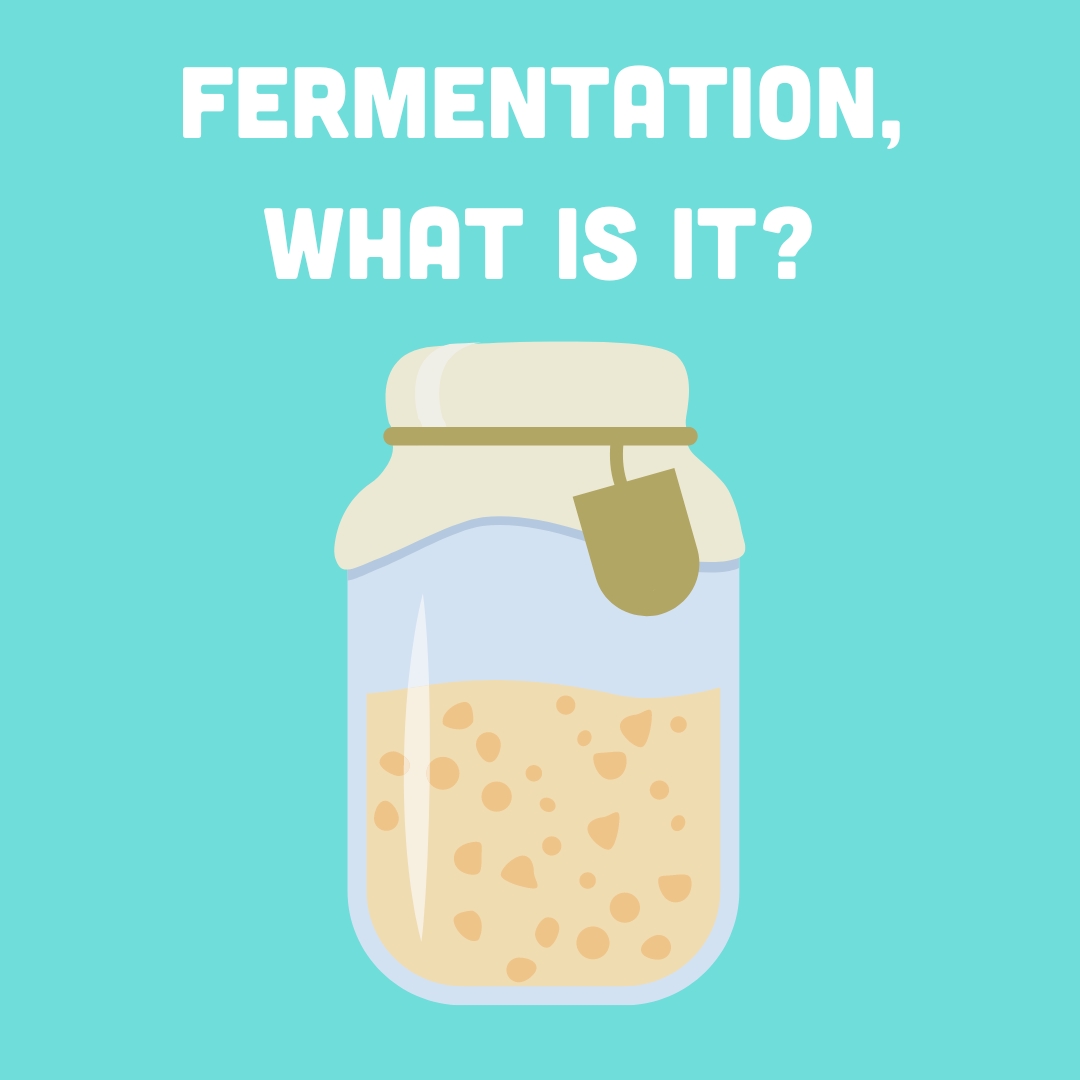Fermentation, What is it?

Yakult is a fermented milk drink available in over 40 countries and regions around the world. Since Yakult is a fermented milk drink, have you ever wondered what fermented foods are and why we eat them? In this article, we will explore fermentation and how fermented foods can be beneficial to those who eat them. Read along to learn more!
A Basic Definition
Fermentation is a scientific process where cells (the smallest living organisms) break down molecules (the smallest version of a substance) anaerobically (without oxygen)1. So in its most basic definition, fermentation is how cells survive, grow and multiply in without oxygen.

Figure 1. Magnified microorganisms growing in the absence of oxygen
In More Detail
No matter how many cells we are made up of, all living things need energy to survive, grow, and multiply. Some living beings like humans, animals and insects are complex beings made up of trillions of cells. When we need energy, we eat food which is broken down by our digestive system into nutrients for us to absorb on the cellular level.
Other beings, known as microorganisms, are made up only of one cell. These include bacteria, fungi and yeasts. These beings are so small that they can only be seen with a microscope! When microorganisms need energy, they do not have complex systems to break down large food sources, so they need to start with the smallest versions of food; sugar molecules2.
Fun Fact: Micro = extremely small, organism = living being
A microorganism is an extremely small living being!

Figure 2. A microorganism gaining energy from sugar molecules
Fermentation for microorganisms is both a process of creating energy and multiplying that occurs in the absence of oxygen3. When the microorganisms are breaking down sugars without oxygen, certain by-products are released4. Some of these by-products can be beneficial for people4, which is why we culture certain bacteria, yeasts and fungi to make food products like bread, soy sauce, yoghurt, and more!
Fun Fact: Fermented foods have been around since 6500 BC!
Benefits of Fermentation
In early civilisations, food needed to be eaten as it was found. Food products would perish and could easily become scarce depending on the environment. In 6500 BC we start to see the first examples of food preservation (extending the shelf life of food products) through fermentation3. There are records of rudimentary versions of cheese being made for the first time when people started herding milk-producing animals3. The cheese was made from fermented milk which lasted longer and allowed people to save their food in periods of scarcity3.
In this example of fermenting milk to make cheese, there were additional positives than just food preservation. As an added benefit, the fermentation process helped to break down lactose, which is a type of sugar only present in milk and dairy products. In early civilisations it was common to be lactose intolerant3, so fermentation allowed people to consume and digest the nutrients in the cheese without being rejected by the body!

Figure 3. Dairy products
This is the same as in Yakult! Our drinks contain the Lacticaseibacillus paracasei Shirota (LcS) strain of bacteria which feeds on the sugars in milk (lactose) to grow. By allowing the LcS bacteria to multiply (or ferment) it lowers the amount of lactose present in the drink, acting as pre-digestion5.
Fun Fact: Each 65ml bottle of Yakult contains less than 1 gram of lactose!
Each type of microorganism feeds on different sugars and produces different by-products during fermentation4. This is why different foods can offer different benefits. Some health benefits of fermented foods include improved nutrient absorption, reduced bowel inflammation, and improved gut microbial balance4. There is also new research emerging suggesting that the microorganisms in our gut can alter our mood and general brain activity4, so by supporting our gut health with both good food and good bacteria, we can help contribute to our overall health and well-being.

Figure 4. Microorganisms in the gut
The science behind fermentation benefits for specific microorganisms is still developing3, however, certain strains such as the LcS strain of bacteria used in Yakult has almost 90 years of research. We continue to research our bacteria to ensure that it is safe and delivers the most amount of health benefits possible to you. The LcS strain is proven to survive our stomach acid to reach our gut alive, improve our good bacteria balance, and encourage regular bowel movements.
You can learn more about the LcS strain and Yakult here
Conclusion
Like all foods, it is important to know where your food comes from and what it is made of to make sure you are giving your body healthy and nutritious fuel. While most fermented foods consumed today contain beneficial bacteria selected by food scientists3, some can contain wild microorganisms with untested benefits or potentially harmful effects. At our factory, we follow strict food safety and hygiene guidelines to keep our Yakult safe, healthy, and delicious. We welcome you to come and visit our factory to learn more about us and experience the benefits of Yakult first-hand.
References
- The Editors of Encyclopedia Britannica. (2024, August 2). Fermentation. https://www.britannica.com/science/fermentation
- Ross RP, Morgan S, & Hill C. (2002). Preservation and fermentation: past, present and future. International Journal of Food Microbiology, 79(1-2). https://doi.org/10.1016/S0168-1605(02)00174-5
- Leeuwendaal NK, Stanton C, O’Toole PW, & Beresford TP. (2022). Fermented foods, health and the gut microbiome. Nutrients 14 (7). https://doi.org/10.3390/nu14071527
- Marco ML, Heeney D, Binda S, Cifelli CJ, Cotter PD, Foligné B, Gänzle M, Kort R, Pasin G, Pihlanto A, Smid EJ, & Hutkins R. (2017, April). Health benefits of fermented foods: microbiota and beyond. Current Opinion in Biotechnology, https://doi.org/10.1016/j.copbio.2016.11.010
- Melini F, Melini V, Luziatelli F, Ficca AG, & Ruzzi M. (2019). Health-promoting components in fermented foods: an up-to-date systematic review. Nutrients, 11(5). https://doi.org/10.3390/nu11051189
